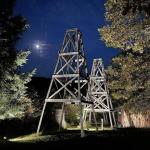Left Behind, pp. 10-15
We turn now to the worst crime against plausibility in Left Behind’s early pages.
I’ve already said quite a bit about LaHaye and Jenkins’ description of the massive, all-out, leave-no-warhead-behind nuclear surprise attack that Russia and Ethiopia launch on Israel. (A war motivated, they suggest, purely by spite and envy.)
What I haven’t mentioned yet is that this massive nuclear assault produces not a single casualty in Israel. The only thing damaged, we are told, are the Russian planes and warheads themselves, which are destroyed utterly. Thus Buck Williams is able to provide his account as an eyewitness from ground zero of a nuclear war:
… The building shook and rattled and rumbled. And yet it was not hit.
Outside, warplanes slammed to the ground, digging craters and sending burning debris flying. Yet lines of communication stayed open. No other command posts had been hit. No reports of casualties. Nothing destroyed yet. …
Thousands of planes swooped down on the tiny country’s most populated cities. …
The sky was afire. He still heard planes over the din and roar of the fire itself, and the occasional exploding missile sent new showers of flame into the air. He stood in stark terror and amazement as the great machines of war plummeted to the earth all over the city, crashing and burning. But they fell between buildings and in deserted streets and fields.1 Anything atomic and explosive erupted high in the atmosphere …
Then came chunks of ice and hailstones big as golf balls … The earth shook and resounded …
Miraculously, not one casualty was reported in all of Israel. Otherwise Buck might have believed some mysterious malfunction had caused missile and plane2 to destroy each other. But witnesses reported that it had been a firestorm, along with rain and hail and an earthquake, that consumed the entire offensive effort.
Had it been a divinely appointed meteor shower? Perhaps. But what accounted for hundreds and thousands of chunks of burning, twisted, molten steel smashing to the ground in Haifa, Jerusalem, Tel Aviv, Jericho, even Bethlehem3 — leveling ancient walls but not so much as scratching one living creature?4
All of this is rather remarkable, to say the least, but it is also, arguably, the most plausible thing to happen so far in the book.
I say “plausible,” not “realistic.” And in this case, there’s a difference.
What we have here is a deus ex machina — the direct, miraculous intervention of the gods. Or in this case, of God. I’m okay with this. Since the ancient Greek dramatists, this has been a legitimate literary device.
L&J have the right, as authors of a work of fiction, to make Almighty God a character in their story. When they decide to have God arrive, descending on a wire, swatting aside thousands of nuclear warheads with supernatural hail and brimstone as a kind of holy missile shield, it would be churlish of the reader to object. It’s a deus ex machina, a convention — go with it. You don’t want to be the sort of person who walks out on a production of A Midsummer Night’s Dream just because you don’t believe in fairies.
But there’s still a problem here. Having invoked the authorial privilege of deus ex machina, L&J fail to abide by the rules of the convention and it is here that they stumble into the most absurd and bizarre implausibility.
At the end of Euripides’ play Orestes, all hell is about to break loose, the armies of Sparta and Argos are about to wreak horrible destruction and death. Then presto — the god Apollo arrives, orders everyone to make nice, sends Menelaus home and fixes up everything before carrying (“rapturing,” if you will) Helen off to Olympus.
Imagine an epilogue to this scene in which the soldiers explain that, despite everything they have just seen, they still don’t believe in Apollo. They have just witnessed the blatant, irrefutable appearance and activity of the god himself, forever altering their lives and the history of their nations, but they prefer not to think about it too much.
That is what happens in Left Behind. Here you have God appearing center stage. A direct, incontrovertible divine miracle witnessed by millions. Absolute, doubt-destroying, skeptic-shattering proof of the existence of God. There’s freaking divine flame in the sky. Yet it produces nary a ripple of wonder, awe or spiritual searching. Alone among the millions who witnessed this event, Buck Williams is slightly prompted to be more “spiritually attuned.”
The people in this novel are not human.
Imagine, in a world of humans, if a single Russian warhead had been launched toward Israel, but was destroyed harmlessly by a freak hailstone high in the atmosphere. That alone would be sufficient to launch a global debate about miracles. Here you have an entire arsenal destroyed, with the secondary miracle of the harmless falling debris, and there’s not a peep. (Remember too that this occurs a year before all the devout are snatched away, meaning L&J would have us believe that such an event could occur without even the televangelists noting that it seems to have been a miracle.)
– – – – – – – – – – – –
1. A few pages earlier, L&J told us that “every inch of ground blossomed with flowers and grains.” So where did all these “deserted fields” come from?
2. I know almost as little about the strategy of nuclear war as L&J do, but it seems to me that if you’re about to rain thousands of ICBMs down on a target, you probably don’t want or need to send thousands of planes as well, unless you don’t particularly care for your air force.
3. The West Bank cities of Jericho and Bethlehem are mentioned here as part of “Israel,” underscoring once again the remarkable transition in which, “Flush with cash and resources, Israel made peace with her neighbors.” By “made peace with,” apparently, L&J mean “absorbed the territory and overthrew the sovereignty of.” L&J portray this as occurring with the cheerful acquiescence of Israel’s Arab neighbors.
4. UPDATE: In the comments to this previous post, Grimgrin provides a lovely overkill of detail about the overkill of L&J’s fictional assault. Grimgrin calculates that the Russian arsenal packs about 2541.75 gigatons of explosive power, sufficient to strike every square kilometer of Israel with 122 megatons. (And that’s not including the additional firepower, ahem, supplied by Ethiopia.)
















